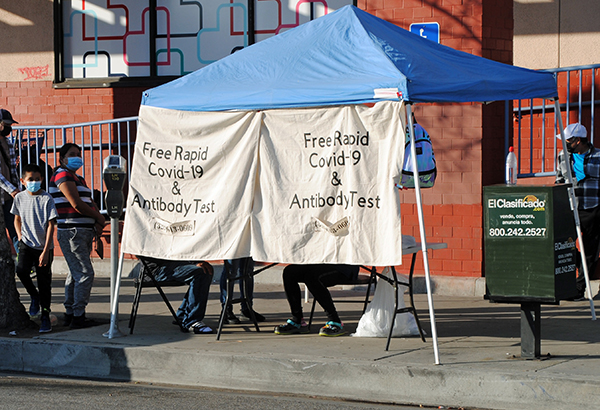By Alfredo Santana
Contributing Writer
LOS ANGELES — A rash of bogus COVID-19 test sites in Southeast Los Angeles forced authorities in South Gate and Bell to shut down six operations, sparking calls from county and local leaders to avoid those operations and refuse to pay cash or provide personal information when getting tested.
In response to the spread of fraudulent sites, county Supervisor Janice Hahn directed the county Department of Consumer and Business Affairs to crackdown on unauthorized pop-up tents anywhere in the county.
“It is despicable that people are taking advantage of communities during a deadly pandemic,” Hahn said in a letter to Rafael Carbajal, director of the Consumer and Business Affairs Department. “Testing is one of our most important tools during this pandemic and residents need assurance that they will get accurate tests results and their information will be protected.”
Some residents have reportedly paid up to $200 in cash to obtain COVID-19 test results that may not arrive at all, endure long lines outdoors to grab self-test kits that include nose swabs and clinical placement tubes before they can turn them in to the providers.
Hahn visited the Lynwood Library Jan. 25 and announced the opening of an onsite testing operation there and at another county library in Pico Rivera. The new additions are part of 13 authorized sites that offer free PCR tests with results ready in one to three days.
The test sites will provide kits with nose swabs and lab tubes in plastic bags to walk-in residents until supplies are finished. Once someone obtains a kit, that person should register online and follow instructions inside the packages for self-test and return the sample to the site.
Hahn emphasized the pickup tests kits are free for people with COVID-19 symptoms and for individuals who think they have been exposed to the virus.
In her letter to Carbajal, Hahn said some of the fake sites “were charging people for tests and never provided results, while others were asking people to disclose their Social Security number.”
Before Bell and South Gate acted against the illegal pop-up sites, a motion from Supervisor Kathryn Barger was unanimously approved to devise a plan in conjunction with the Public Health, Health Services and Sheriff’s departments to mitigate testing scams across the county.
“I appreciate that this planning is underway, but we need more immediate action,” Hahn told Carbajal.
Lynwood City Councilwoman Marisela Santana posted on her Facebook page that Southeast Los Angeles leaders are working hard to make residents aware of the existence of fraudulent COVID-19 testing sites.
“With testing in high demand, and COVID-19 and its variants running amok, we all understand everyone’s need for immediate results, but we also need to make sure that our communities are safe from fraud,” Santana said. “Unfortunately, a lot of pop-ups are asking for Social Security numbers and charging cash for rapid results,”
Santana said Lynwood is limited to ask for the sites’ registration with legitimate laboratories or medical facilities, and cannot sanction pop-ups set on private properties.
On Jan. 19, Santana wrote she visited a shoddy testing site in the area out of curiosity, following a series of COVID-19 transmissions at her home.
Six days had passed, and the site yielded no results.
“I wanted to be tested at a site where I see my community going for hopeful results,” Santana said. “That was the only time for me, but I’ve read and heard about hundreds of complaints about other pop-ups throughout the region.”
Santana said her godson tested negative at the same Lynwood operation, despite measuring a body temperature of 103 degrees.
Three tests later, the child came up positive, she said.
In South Gate, an illegitimate testing site at a shopping mall near a CVS pharmacy on Tweedy Boulevard was closed after inspectors found it did not comply with county and city licenses.
“We are afraid of long-term effect, perhaps identity fraud,” South Gate Councilwoman Denise Diaz told ABC’s Eyewitness News.
To be legitimate, pop-up sites need accreditation from a medical facility, have county and city licenses, and receive authorization from the county’s health department.
If any of the three requirement are missing, their operation can be halted, Diaz said.
Another pop-up rapid test site near a CVS pharmacy at the corner of North Broadway and Workman Street in Lincoln Heights marketed free COVID-19 tests to anyone fearful of being exposed to the dominant Omicron variant.
A woman identified as Mrs. G., said the site with a tent on the curb functions in liaison with a lab in Rancho Cucamonga, as 12 people waited in line ahead of her to get their free COVID-19 test.
After she picked up her daughter from school, Mrs. G. visited the pop-up site to get tested for a second time. Last week, she came back negative after waiting five minutes for the results, and now wanted to confirm it.
The testing site did not require proof of ID, insurance card or ask for money, she said.
“This site started offering free tests the first week of January,” she said. “I have not heard of any complaints.”









